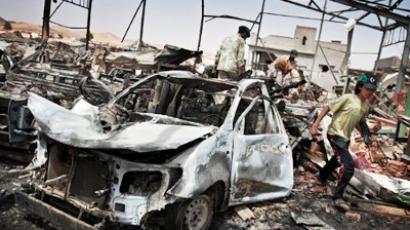Gun bonanza - is arms flood unstoppable?
Conflict zones like present-day Libya are a major source of illegal weapons, which end up in the hands of criminals and terrorists. RT discussed the issue with Brian Johnson-Thomas, a former arms-trafficking expert for the UN Security Council.
He says the problem of guns circulating with no government controls is especially acute in Africa, where borders are often merely symbolic.“At least in terms of criminals, they tend not to stay within borders. It’s easy to organize a bank robbery in Tunis or in Cairo on the basis of weapons you get from this turmoil in Libya. The problem is that the only way you can get a society where the gun is not king is if you have individuals with respect for the rule of law. We have to have trust in our police forces. There are never enough policemen to control a population by force. So we have to be policed by consent,” he said.Johnson-Thomas says the most serious problem is that the number of guns in circulation is increasing exponentially. “The problem with the arms trade worldwide is that every year we make more guns than are destroyed, so every year the total number of weapons on the planet is increasing quite significantly. I think that something like ten times more guns are made than are destroyed every year. The United Nations is working in conflict zones to try to get guns out of circulation through buy-backs and various other programs, but that is nullified by the fact that everyone still makes guns. I was always struck by how cheap guns are to make and sell,” he explained.What little success the UN has had in controlling gun-trafficking is undermined when the very nations which vow to enforce UN Security Council resolutions circumvent them for the sake of their political interests. Such was the case when France dropped weapons to rebels in Libya despite a UN arms embargo.“When a permanent member of the Security Council goes around a resolution they voted for, I think it’s a very bad show. You know, the real world sometimes is not a nice place to be in. A British Foreign Secretary back in the 18th century said that Britain has no permanent friends, only permanent interests. I think it’s true of every country… People will look at their interests as they see them at the time. But yet it’s a bad thing. The United Nations system is not perfect. I worked in it and for it and I am well aware of its failings. But by God it’s better than nothing else. It is the best system we have,” the expert said.














